Building a startup requires a vision for your business, an opportunity in the market, a deep understanding of the landscape—and a whole hell of a lot of work. We know, because we’re building Unstack now, too.
That’s why we compiled 67 of the most important startup statistics, covering funding, founders, marketing, and more. We were curious and wanted to learn what the last year’s looked like for startups, and we wanted to share that in case it’s helpful information for you, too.
(Spoiler: We think it will be.)
Let’s jump in.
Startup Statistics: General
1. Last year, 804, 398 new businesses were started in the US. (Statistica)
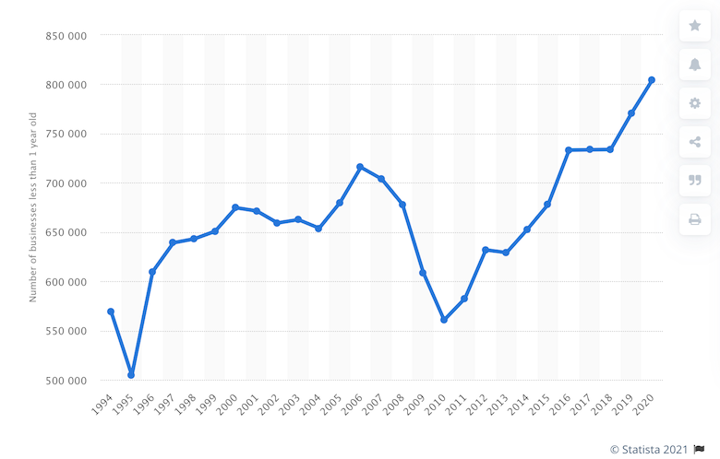
2. 49% of small business owners plan to increase their staff this year. (Guidant Financial)
3. There are 30.7 million small businesses in the US. (Small Business Administration)
4. This accounts for 99.9% of all businesses. (Small Business Administration)
5. Startups created 3,114,111 jobs in the US last year. (Statistica)
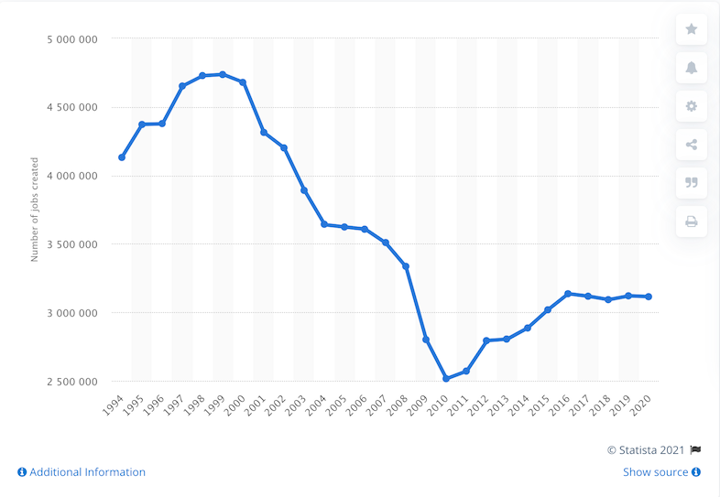
6. The top five places for startups—ranked by market growth, funding, talent, and more—are Silicon Valley, New York, London, Beijing, and Boston. (Startup Genome)
7. 80.3% of small businesses feel that local governments haven’t supported them with enough funding during the coronavirus pandemic. (Fundera)
8. 86.23% of businesses haven’t received any relief funding from state or local governments during the COVID-19 pandemic. (Fundera)
9. Fintech startups account for 7.1% of startups globally. (Statistica)
10. Startups with mentors grow 3.5 faster and raise 7x more money. (Forbes)
11. Colleges in the US offering formal entrepreneurship programs, including majors and minors, grew from 104 in 1975 to more than 500 in 2006. (Source)
12. 40% of startups operated in the “red zone,” (so had less than three months of operating capital) in the middle of 2020. That’s up 29% since December 2019. (Startup Genome)
13. 42% of startups that fail do so because there isn’t a market need for the product or offering. (CB Insights)
14. 71% of startups don’t have referral programs in place. (Unstack)
15. The biggest challenge for most startups is lowering customer acquisition costs. (Unstack)
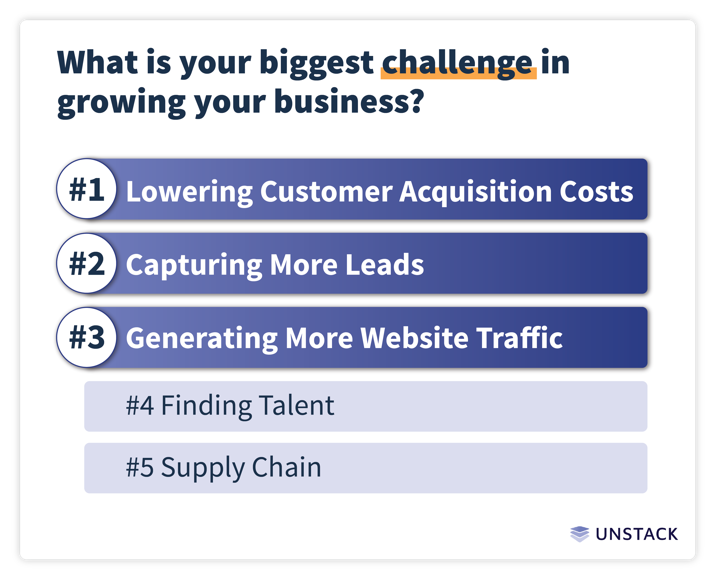
16. Half of small businesses make it more than 5 years. (US Small Business Administration)
17. More than 40% of US businesses operate in industries that are high-risk during COVID-19. (Pew Research Center)
18. 74% of small businesses have an annual revenue of less than $1 million. (Pew Research Center)
19. Madison, WI is the best untapped city for startups. (Fundera)
20. Other top untapped cities for startups include Plano, TX, St. Paul, MN, and Cincinnati, OH. (Fundera)
21. 52% of startups have seen increased business or normal business during the coronavirus pandemic. (National Bureau of Economic Research)
22. 61% of startup job searches were looking for remote opportunities as well as in-person positions. (National Bureau of Economic Research)
23. 76% of the job applications go to startups with fewer than 50 employees, 42% to startups in seed or pre-seed stage, and 18% to startups post-C round. (National Bureau of Economic Research)
Startup Statistics: Funding
24. 75% of venture-backed startups have investors who never receive cash returns. (Failory)
25. Out of those companies, 30-40% have investors who lose their entire initial investment. (Failory)
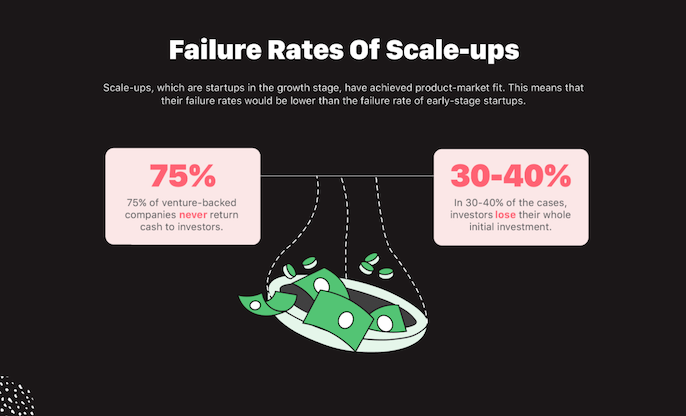
26. 23% of startups that fail do so because they didn’t have the right team of founders. (CB Insights)
27. 1 in 3 businesses start with less than $5,000 in capital. (CB Insights)
28. 36% of hopeful founders identify getting funding for their business a top priority. (Quickbooks)
29. More than half of our startup marketing survey respondents are traditional businesses. Another 13% are venture-backed, and 11% have revenue-based financing. (Unstack)
30. 2021 saw the biggest increase in female business owners, up 13% from the previous year. (Guidant Financial)
31. The most popular financing options for startups in 2021 was cash. (Guidant Financial)

32. Nearly half of US venture capital funding comes from “mega rounds.” (CB Insights)
33. It is estimated that startup exit deals worldwide amounted to $219 billion in 2018. (Statistica)
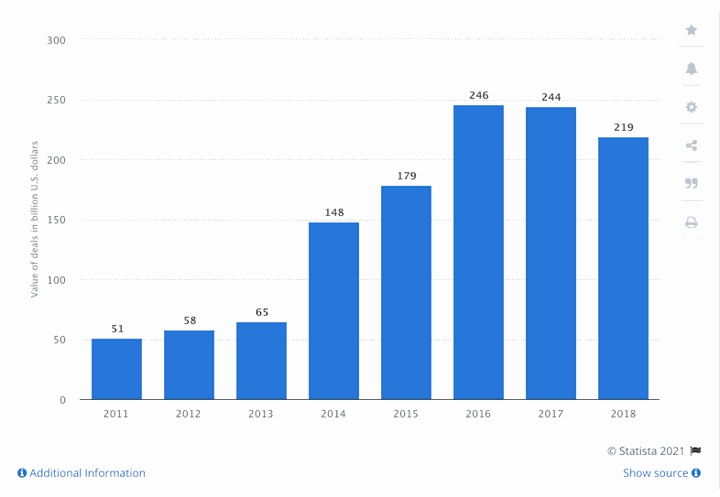
34. There were an estimated 600 unicorn-valued startups in 2020. (Statistica)
35. The majority of these businesses were in the US and China. (Statistica)
36. The average seed round is $700,000. (CB Insights)
37. 48% of seed-round startups made it to their second round. (CB Insights)
38. 1% reached unicorn status. (CB Insights)
39. White startup founders receive an average of $18,500 in outside equity funding, while BIPOC founders receive an average $500. (Fundera)
40. 80.2% of white startup founders receive at least a percentage of requested funding from a bank. 66.4% of BIPOC startup founders do. (Fundera)
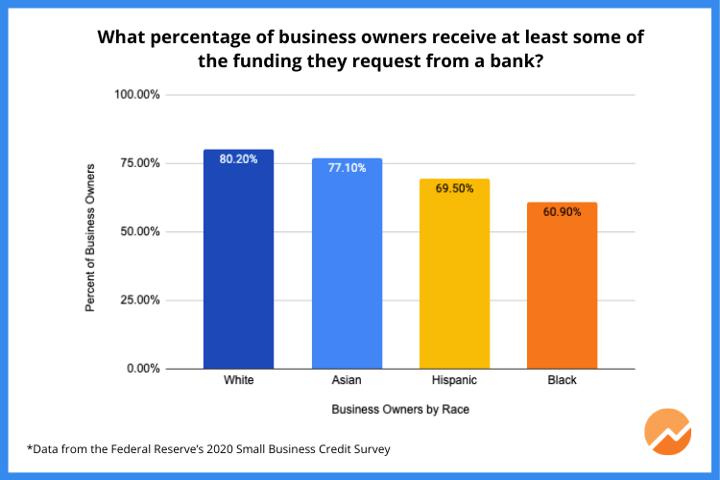
41. 30% of seed-funded startups had an IPO or merger/acquisition exit. (CB Insights)
42. The average time between raises was 20 months. (CB Insights)
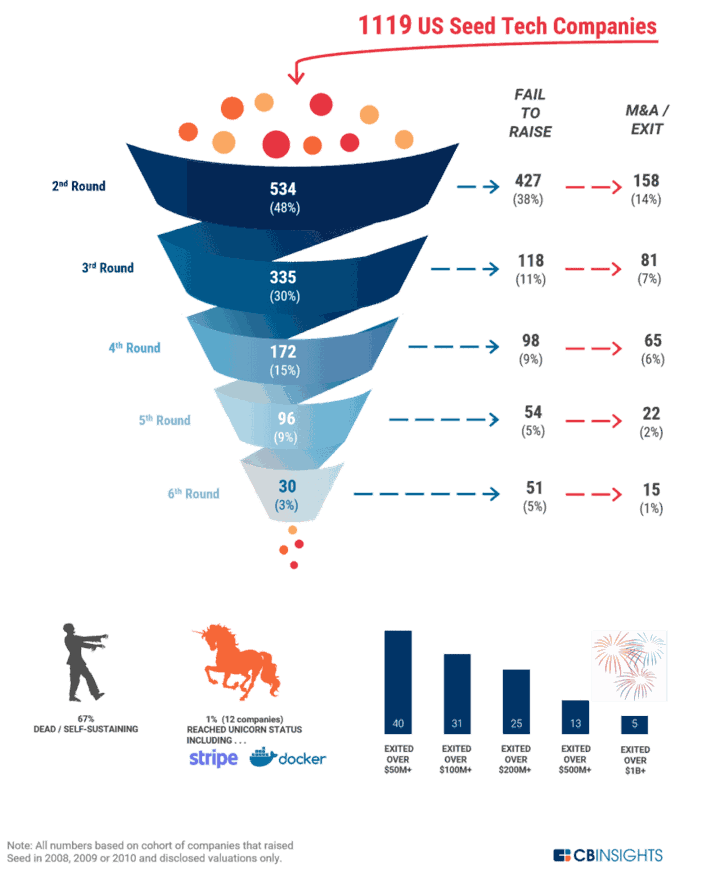
43. FAMGA has made 32 $1B+ acquisitions. (CB Insights)
44. More than 9,600 investor-backed startups received PPP funding. (CB Insights)
45. Startups with two founders raise 30% more capital than startups with one founder. (Inc)
Startup Statistics: Founders
46. The gender disparity in founders is still significant: 68% of small business owners in the US are men, while 32% are women. (Guidant Financial)
47. 60% of adults in the US know someone who has started a business in the past two years. (GEM Global Entrepreneurship Monitor)
48. More than 80% of adults in Saudi Arabia know someone who has started a business in the past two years. (GEM Global Entrepreneurship Monitor)
49. Less than 20% of adults in Japan know someone who has started a business in the past two years. (GEM Global Entrepreneurship Monitor)
50. 44% of adults in the UK see good business opportunities in their area. (GEM Global Entrepreneurship Monitor)
51. 82% of adults in the UK believe that it’s easy to start a business. (GEM Global Entrepreneurship Monitor)
52. More entrepreneurs are focused on consumer services than business services. (GEM Global Entrepreneurship Monitor)
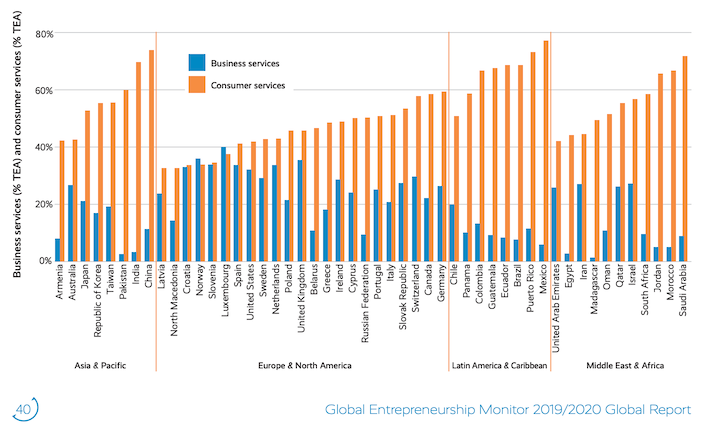
53. Almost half of entrepreneurs in the US are between the ages of 25 and 44. (GEM Global Entrepreneurship Monitor)
54. 1 in 5 startup founders runs a business with a family member. (GEM Global Entrepreneurship Monitor)
55. 58% of startup founders had a corporate job before starting their own company. (Xero)
56. 56. Serial entrepreneurs run an average of three businesses over their lifetime. (Freshbooks)
57. Business owners consider communication the most important skill any founder needs. (Freshbooks)
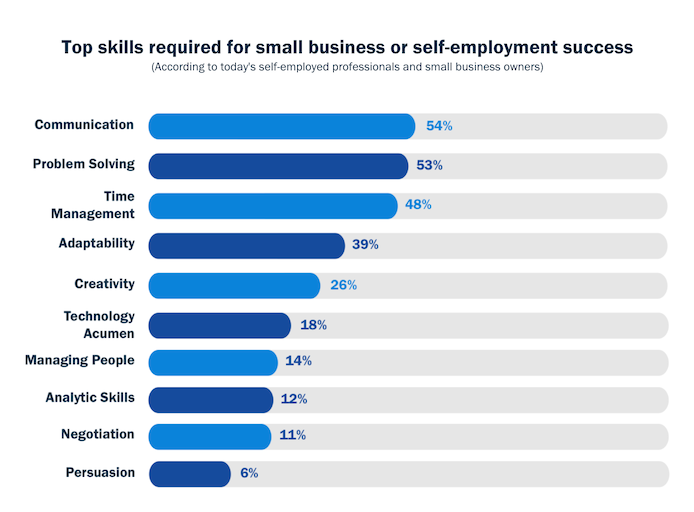
58. Employees working at small businesses are more likely to found their own company. (Freshbooks)
59. 80% of small business owners make less than $100,000 a year. (Fundera)
60. 30% of small business owners take no salary at all. (Fundera)
61. Solo founders are 54% less likely to close a business. (SSRN)
62. Most business owners in the US are men, and most are white. (Pew Research Center)
63. Startups with non-technical founders perform 31% better. (Forbes)
Startup Statistics: Marketing
64. Startups that sell their products before launch convert 40-50% of leads and win 80-90% of renewal business. (HBR)
65. 66% of startups surveyed had marketing teams with 1-3 people. (Unstack)
66. Startup founders see SEO and content marketing as the most important marketing channels for growing their business. (Unstack)
67. 54% of startups producing content publish 1-4 blog posts each month. (Unstack)
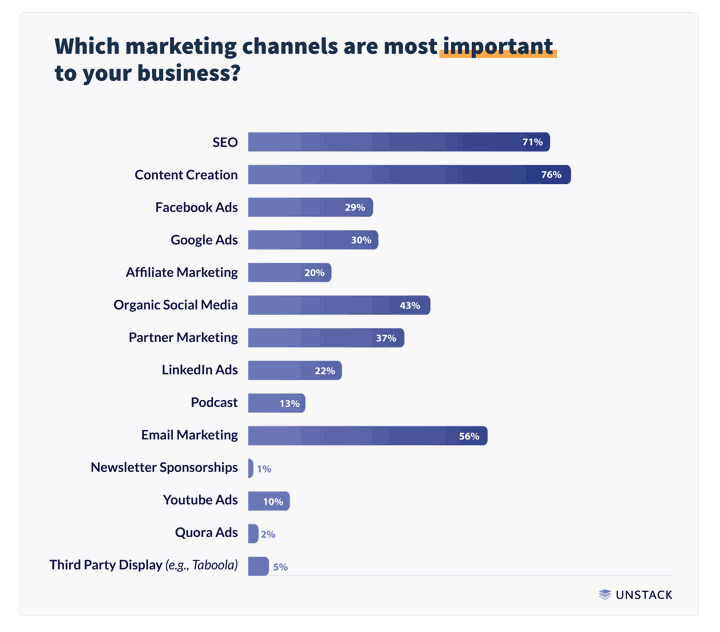
Use these startup statistics when you’re launching your business
There you have it: 67 data-backed facts about startup funding, startup success rates, startup founders, startup marketing and more. These statistics will be helpful whether you’re working on your business plan, planning your launch, or scaling your startup, so bookmark this page to return for reference.
